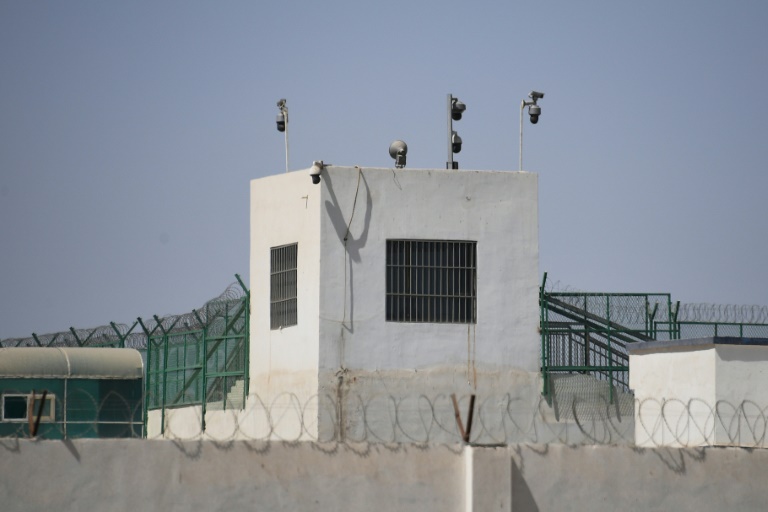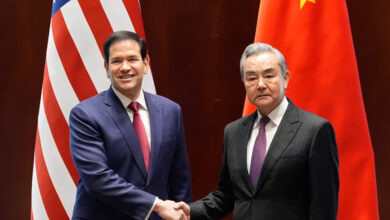
The US House of Representatives overwhelmingly passed legislation Tuesday that would apply sanctions against senior Chinese officials, triggering a furious response from Beijing.
The legislation adds to tensions between the two superpowers just as they are locked in negotiations to finalize a “phase one” deal to resolve their protracted trade war.
Washington had already angered Beijing when President Donald Trump signed legislation supporting pro-democracy protesters in Hong Kong, prompting China earlier this week to impose sanctions on US-based NGOs and suspend future visits by US warships to the semi-autonomous territory.
The Uighur Act of 2019 condemns Beijing’s “gross human rights violations” linked to the crackdown in the northwestern region of Xinjiang, where upwards of one million Uighurs and other mostly Muslim minorities are believed to be held in re-education camps.
The measure, which passed 407 to 1, is a stronger version of the bill that cleared the Senate in September. The texts must be reconciled into one bill for Trump’s signature.
The latest House measure condemns the arbitrary mass detention of Uighurs and calls for closure of the re-education camps where, according to rights groups and US lawmakers, they have been held and abused.
The bill notably urges Trump to slap sanctions on Chinese officials behind the Uighur policy, including Chen Quanguo, the Communist Party chief for Xinjiang.
“Today the human dignity and human rights of the Uighur community are under threat from Beijing’s barbarous actions, which are an outrage to the collective conscience of the world,” House Speaker Nancy Pelosi told her colleagues shortly before the vote.
Congress “is taking a critical step to counter Beijing’s horrific human rights abuses against Uighurs,” she said.
“America is watching.”
Pelosi lashed out at Chinese authorities for orchestrating a crackdown that includes pervasive mass state surveillance, solitary confinement, beatings, forced sterilization “and other forms of torture.”
– ‘Wantonly smears China’ –
Beijing called on the United States to prevent the bill from becoming law and warned — without elaborating — that it would respond “according to the development of the situation.”
The bill “deliberately denigrates China’s human rights situation in Xinjiang, wantonly smears China’s efforts to eliminate extremism and combat terrorism (and) viciously attacks the Chinese government’s policy of governing Xinjiang,” foreign ministry spokeswoman Hua Chunying said in a statement.
The Chinese state-owned tabloid The Global Times quoted experts as saying Beijing will take “strong countermeasures” including releasing an “unreliable entity list” that could sanction and restrict some US entities in the country and impose sanctions on US officials.
Last month two huge leaks of official documents offered more details about China’s network of internment camps in Xinjiang.
Government papers obtained by the International Consortium of Investigative Journalists (ICIJ) outlined the need to prevent escape, double lock doors and constantly monitor detainees — even during toilet breaks.
The New York Times reported, based on internal papers it had obtained, that Chinese President Xi Jinping ordered officials to act with “absolutely no mercy” against separatism and extremism in Xinjiang in 2014 following a deadly knife attack blamed on separatists.
Rights groups and witnesses accuse China of forcibly trying to draw Uighurs away from their Islamic customs and integrate them into the majority Han culture.
After initially denying the camps’ existence, Beijing cast the facilities as “vocational education centers” where “students” learn Mandarin and job skills in an effort to steer them away from religious extremism, terrorism and separatism.
– ‘Wipe out Uighur identity’ –
The House bill would require the State Department to produce a report within one year on the crackdown in Xinjiang.
And it would require the Commerce Department to ban US exports to entities in Xinjiang that are known to be used in the detention or surveillance of Muslim minorities, including facial recognition technology.
Thomas Massie, the sole member of Congress to vote against both the Hong Kong and Uighur bills, said he did so because he considered the issues to be Chinese domestic affairs.
“When our government meddles in the internal affairs of foreign countries, it invites those governments to meddle in our affairs,” he said in a tweet.
Republican Senator Marco Rubio warned that China’s government and Communist Party are “working to systematically wipe out the ethnic and cultural identities” of Uighurs.
Advocacy organization The Uyghur Human Rights Project (UHRP), said the US action “paves the way for other countries to act.”
“Each and every speech on the House floor tonight was a forceful indictment of crimes against humanity,” said UHRP executive director Omer Kanat.
“Tonight’s action gives Uyghurs hope.”




